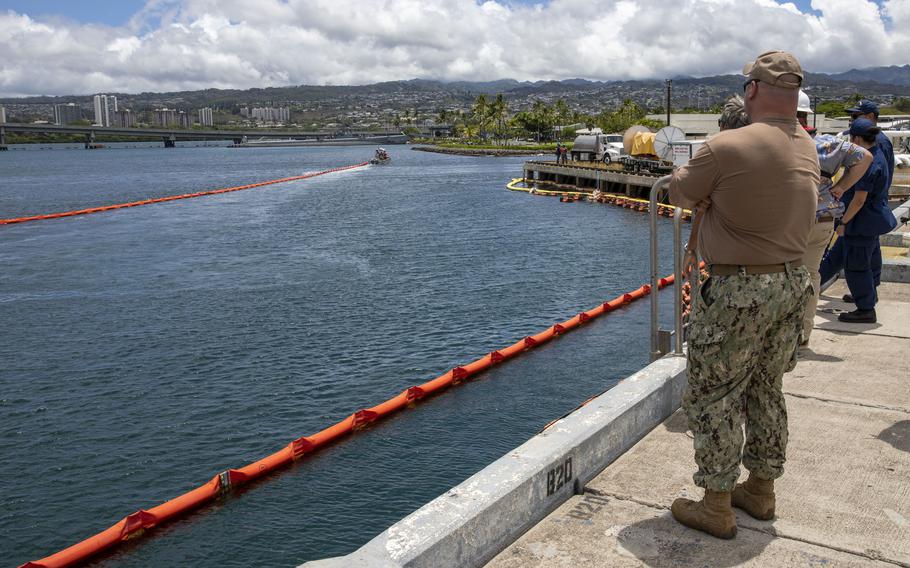
Joint Task Force-Red Hill (JTF-RH) and spill response personnel perform and observe a spill response exercise on Joint Base Pearl Harbor-Hickam, Hawaii, June 8, 2023. (Matthew Mackintos/U.S. Army)
(Tribune News Service) — Members of Hawaii's congressional delegation have introduced bipartisan legislation that would require the U.S. Department of Health and Human Services to set up a new registry to track and collect health data from people who were exposed to tap water laced with jet fuel from the Navy's Red Hill fuel facility in 2021.
The Red Hill Health Impact Act also would require the federal agency to work with health experts to conduct a 20-year study to assess any long-term health effects on those exposed to the contamination and work with other government agencies to identify any additional resources that may be available to affected families.
"People who were exposed to toxic fuel from this leak should know what kind of impact that might have on their long-term health and what kind of additional federal help they can get," said U.S. Sen. Brian Schatz, D-Hawaii, who introduced the measure along with U.S. Rep. Ed Case, D-Hawaii. "This study will give doctors, public health experts, and those affected by the leak a better understanding of what that kind of exposure can do to someone's health."
Case said the proposed legislation expands the delegation's efforts to ensure that health concerns from Red Hill families will continue to be monitored and addressed beyond the immediate crisis.
In November 2021, a leak at the underground fuel facility migrated into the Navy's drinking water system that serves about 93,000 people living in neighborhoods in and around Joint Base Pearl Harbor-Hickam. Thousands of residents reported fuel odors emanating from their tap water and symptoms including vomiting, diarrhea, skin rashes, burns and headaches.
In the months following the disaster, the U.S. Department of Defense set up a registry to keep track of military families who were affected by the fuel contamination. Residents living in affected neighborhoods were automatically enrolled in the Oahu Military Water Contamination Incident Report Registry.
The state Department of Health and U.S. Centers for Disease Control and Prevention also have conducted surveys on the health effects of the fuel contamination and have worked to better understand the chemicals that people were exposed to, along with the potential short-term and long-term health implications.
The proposed legislation aims to bolster those efforts and provide more funding and guidance. HHS would be provided with $4 million to conduct the long-term study.
The measure also requires HHS to submit annual reports to congressional committees that include its strategies for communicating and engaging Red Hill families, the number of people enrolled in the registry, the processes for connecting those affected with services and followup actions to collect data and specimens related to potential health effects from exposure.
Co-sponsors of the bill include U.S. Sens. Mazie K. Hirono, D-Hawaii, and Jerry Moran, R-Kan., and U.S. Rep. Jill Tokuda, D-Hawaii.
(c)2023 The Honolulu Star-Advertiser
Visit www.staradvertiser.com
Distributed by Tribune Content Agency, LLC.